Nurses Strike
The Winter of Discontent
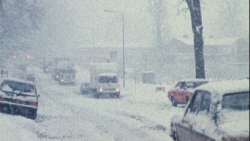
Snow Disrupted Traffic
The trouble began in September, when at a Ford car plant on Merseyside, the workers went on strike over pay. Five other factories immediately followed
suit. After eight weeks, the company handed them an inflation-busting 17 percent pay rise.
Now that Ford had surrendered, the floodgates burst. British Leyland car workers, coalminers, gas workers, even bakery workers, all demanded double-digit
increases of their own. Most spectacularly, Britain's 50,000 lorry drivers wanted a pay rise of 60%. And then, it started snowing.
Road and rail services everywhere were severely disrupted. Only the polar bears and penguins at London zoo seemed untroubled. And then, the lorry
drivers began their walkout, immediately cutting the supply of food and fuel across the country. Within days, there were reports of panic buying in
the shops and rationing at petrol stations.
Mrs Thatcher seized the moment. Her party political broadcast on 17 January 1979 was a masterstroke, precisely because it appeared not to be political
at all. Instead, she appealed to her audience to put aside their differences for the good of the nation.
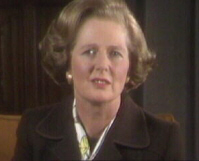
Margaret Thatcher
Margaret Thatcher "That no-one, however strong his case, is entitled to pursue it by hurting others. There are wreckers among us who don't believe
this. But the vast majority of us, and that includes the vast majority of trade unionists, do believe it, whether we call ourselves Labour,
Conservative, Liberal or simply British. It's to that majority that I'm talking this evening. We have to learn again to be one nation, or one day
we shall be no nation. If we've learned that lesson from these first dark days of 1979, then we've learned something of value."
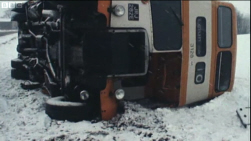
Overturned Bus
But the days were about to get an awful lot darker. On 22 January, the three public sector unions called a simultaneous day of action to demand a
£60-a-week minimum wage. And with one and half million people walking out on strike, this was the biggest and most effective industrial action
since the General Strike of 1926.
The two weeks that followed were among the grimmest in Britain's peacetime history. The day of action was extended into weeks of action. Dustmen,
ambulance drivers, caretakers, bus drivers, road gritters and many more began a series of rolling strikes that caused total chaos.
TV pictures of piles of uncollected rubbish were bad enough, but it was the reports of medical supplies being blocked and of gravediggers refusing
to bury the dead that began to convince many, even on the left, that their unions had simply lost their minds.
This is a world-famous children's hospital at Great Ormond Street in London. In February 1979, this was the location of perhaps the saddest single
incident of the entire Winter of Discontent.
A walkout by support staff at a children's hospital was, the newspapers said, Britain's sickest strike. As the workers marched out, they told
reporters they'd all go back if there was an emergency, but that was cold comfort for the strikebreaking nurses who stayed on, having torn up
their union cards in disgust.
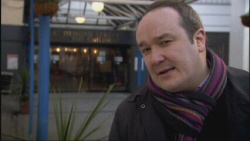
Great Ormond Street Hospital
Hospital ancillary workers, cleaners, caretakers, catering staff, were among the worst paid of all public sector workers. But the images of sick
children having to be cared for in hospital by their parents were more than enough to turn public opinion decisively against the unions.
After weeks of disruption, from the toxic combination of bad weather and crippling strikes, the Labour Prime Minister Jim Callaghan conceded
whopping pay rises for the public sector workers. By the beginning of March, the strikes were over, but the reckoning was about to begin.
At the time, the Winter of Discontent was seen as a supreme triumph of union power. But the irony was that in the long-term, it was a catastrophe for
the unions.
At the end of January, a Gallup poll found 84% agreeing that the trade unions were too powerful, the highest figure in the survey's history.
The Prime Minister was the first to feel the blast of the wind of change. On 28 March, Callaghan's government lost a vote of no confidence. An
election was called for 3 May. The Thatcher machine went into overdrive.
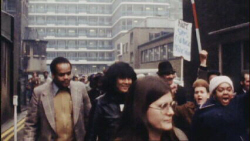
Striking Hospital Staff
Mrs Thatcher's campaign was famously slick. Advertising agencies had run election campaigns in Britain before, but no-one had marketed a candidate
with as much energy and insight as Saatchi & Saatchi presented Mrs Thatcher.
Her days were scheduled to deliver maximum exposure on the early evening news when her target audience all women, first-time voters and the C2s
would be watching. And as polling day approached she won some vital support.
On the morning of the election, The Sun ran an enormous front page editorial urging its readers, for the first time in the paper's history, to
vote Conservative. "This is D-Day. D for decision, the first day of the rest of our lives."
As the results came in, it quickly became clear that Margaret Thatcher would indeed be Britain's first woman Prime Minister.
Her victory wasn't a landslide, but with 339 seats, she secured a solid majority of 43. And the rulebook of British politics had been rewritten.
In future, anyone wanting to win an election would need to appeal not to the trade union barons, but to the readers of the Sun.
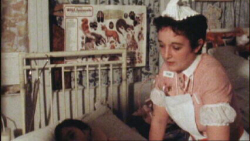
Working Nurse
Mrs Thatcher's victory was a landmark in our political history. But it wasn't just a reaction to the disastrous Winter of Discontent, it marked
the culmination of a decade of tremendous change.
The 70s had made Britain a far more tolerant and open-minded country, but also one that had fallen in love with money. Margaret Thatcher was astute
enough to understand this and that meant she reaped the political rewards.
Of course, nobody back in 1979. Thought Margaret Thatcher would still be there 11 years later. Today, we remember her as the Prime Minister who
changed everything, for good or ill. But the reason she got there in the first place was that more than any other politician of the day, she
realised just how much Britain had changed already. She was taking over a country that was more ambitious, more affluent and more outgoing than
it had been at the beginning of the 70s. And yet one that was also more anxious, more insecure and more individualistic.
No she didn't create all this. She inherited it. From sex and shopping to Europe and education, this was the great watershed in our modern
history. And for decades on, we still live in a world the 70s made.





